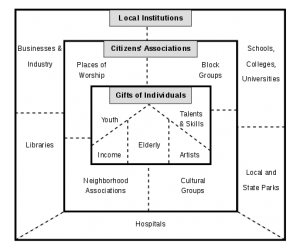CFHI is honored to receive interns from around the world at our offices in San Francisco. This summer we have the pleasure of welcoming Alessandra Khodaverdi from the University of San Francisco. Alessandra is a Master of Public Health student who is deeply passionate about traveling and ensuring global health equity. During and after her internship, she hopes to integrate CHFI’s guiding principles of sustainability, humility, and reciprocity into her own work on community and global health disparities to build a better future for all.
Greetings! I am Alessandra Khodaverdi, an MPH student from the University of San Francisco. I am currently in my final program semester, and am finishing my current capstone project on health equity and access from the lens of undocumented migrant workers in host countries. Recently, I participated in an internship through the United Nations-mandated University of Peace in Costa Rica. This short-term experience in global health (STEGH) made such a profound impact on my life not only as a student, but also sharpened my public health lens as a professional. The first-hand knowledge and education about the integrative aspects of culture, human rights, environment, and sustainable health practices are immeasurable, and I will carry them with me forever.
Benefits and Drawbacks of Short-Term Experiences in Global Health
While high-income countries (HIC) student trainees are embarking on global health experiences in low-and middle-income countries (LMIC) in growing numbers, the perceived benefits and disadvantages for host communities are not well captured. An obvious interest and increased demand for global health education has directly expanded educational programs and STEGHs. However, despite positive intent to gain knowledge and make an impact in developing communities, such STEGHs may actually exacerbate global health inequities. “In the absence of clear definitions, standards, impact data, and appropriate conducts, STEGHs may represent a suboptimal use of time and resources, harm the host community, and even perpetuate global health inequities” [4]. Frequently, an array of ethical issues arise when trainees volunteer or are asked to perform tasks beyond their scope of training. Other factors such as false advertisement by unreliable volunteerism programs, vague admissions criteria, and lack of program and student oversight contribute to an unethical nightmare. This is a particular problem when HIC trainees travel to under-resourced communities where patients are completely unaware that these pre-health students are not actual health professionals, despite the trappings of white coats and scrubs.
A plethora of studies have well-exemplified and highlighted the various benefits of STEGHs for student trainees. Such benefits include increases in skills and confidence, better understanding of the social determinants of health, and dedication to underserved communities back home. As supplemental studies into the underrepresented LMIC voices are desperately needed, a recent CFHI study conducted in La Paz, Bolivia and New Delhi, India revealed important insights into the perspective of LMIC host community members with regards to STEGHs. Benefits for hosts included improvements in job satisfaction, rise in local prestige of physicians and their practices, resource enhancement, and opportunities for global connectedness, leadership skills, and improved local networks and leadership development. Adversely, reported drawbacks for hosting HIC trainees were the perceived hesitancy and apathy of student trainees, unfulfilled promises, lack of cultural sensitivity and equal opportunity. Additionally, the costs of host undertakings continue to go unrecognized despite best practices outlined the Working Group on Ethics Guidelines for Global Health Training (WEIGHT). These WEIGHT guidelines outline and advise the importance of recognizing the true costs in terms of labor, time, and resources for host communities in educational student immersions. [2]
CFHI: Ensuring Reciprocity and Sustainability through Asset-Based Community Engagement and Development
CFHI was designed to prioritize strength-based partnerships, sustainable reciprocal benefits, and clear recognition of costs incurred by host communities. Being that reciprocity and sustainability are central to CFHI’s organizational approach, programs and reciprocal investments in host communities center on the asset-based community engagement/development approach.
With this model, the outsider supports community empowerment by enabling local asset mapping, organizing assets around a mutual agenda, and building consensus toward a shared development goal. The emphasis for support is placed on a community’s existing strengths and potential as the building blocks for success, rather than rewriting the entire script.
As CFHI’s motto is “Let the World Change You,” the organization highlights students as learners, rather than agents of change—as it is imperative that trainees must first understand culture, reality, and context before initiating change. As a future public health professional, these concepts of health equity and sustainability are immensely important, especially in my past work with undocumented women and migrant workers, and future endeavors with vulnerable populations. The most important point I have taken away from both internships so far is the importance of respect —especially for host marginalized communities that invite us to learn. When a mutual respect and cultural understanding is established, it paves the way for open communication, positive leadership, and a true appreciation for the complex challenges and solutions in global health.
Sources:
[1] Cherniak, W., Latham, E., Astle, B., Anguyo, G., Beaunoir, T., Buenaventura, J.H., DeCamp, M., Diaz, K., Eichbaum, Q., Hedimbi, M., Myser, C., Nwobu, C., Standish, K., & Evert, J. (2017) Host perspectives on short-term experiences in global health: a survey. The Lancet Global Health, 5(9). DOI: http://dx.doi.org/10.1016/S2214-109X(17)30116-X
[2] Evert, J. (2015) Teaching corner: child family health international: the ethics of asset-based global health education programs. Journal of Bioethical Inquiry, 12(1), p. 63-67. DOI:10.1007/s11673-014-9600-x
[3] Kung, T.H., Richardson, E.T., Mabud, T.S., Heaney, C.A., Jones, E., & Evert, J. (2016). Host community perspectives on trainees participating in short-term experiences in global health. (2016). Medical Education, 50, p. 1122-1130. DOI: 10.1111/medu.13106
[4] Melby, M. K., Loh, L.C., Evert, J., Praterm C., Lin, H., & Khan, O.A. (2016). Beyond medical “missions” to impact-driven short-term experiences in global health: ethical principles to optimize community benefit and learner experience. Academic Medicine, 91(5). DOI:10.1097/ACM.0000000000001009


